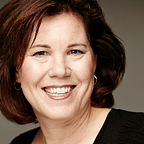How an Idea Becomes a Book, Part 5: What’s Your Point?
This is the fifth part in a series. You can catch up by reading the other parts here: Part One, Part Two, Part Three, Part Four.
You’ve had a brilliant idea, you know why you care about it, and you know who else might care about it. The next step in turning that idea into a book is figuring out your point.
What are you trying to say?
Your answer connects back to your rage and ambition and to the reasons you care about this idea. It also connects to why you think other people might care about this idea — to what they need that you can give them. But it’s not enough to be vaguely aware of the point you want to make, or “in the ballpark” of the point you want to make. You need to really KNOW it and to be able to define it.
So, picture yourself standing on a soapbox with a megaphone.
Picture yourself on a TedTalk stage or with Oprah on Super Soul Sunday.
Picture yourself on the front page of the Harvard Business Review or Inc. or Rolling Stone — wherever would be the pinnacle of success for your area of expertise.
Why are you there? What are you talking about? What has everyone buzzing? You no doubt have something to say about life or love or sports or crime or God or death or magic or cake. If you didn’t have something to say, you would probably be spending your days knitting elaborate sweaters or canning homegrown tomatoes instead of trying to write a book.
Every book is, at heart, an argument for something — for a belief, a way of life, a vision of the future, a way to solve a problem, a way to make a friend, a way to learn something new. What are you arguing for? What’s your point?
Don’t be alarmed if your point sounds like a cliché. There are a vast number of books that can be written with the same point. When you can frame your idea as a cliché, it means you’re getting down to something universal that everyone understands. You will make it unique through structure, shape, and voice, so there’s no need to worry about it being simple or obvious.
The Point of These Blog Posts
Here is my brainstorm for the point of these blog posts. I worked on the point over a few days — starting and stopping, coming back to it, refining it. This brainstorm was tied to my answer to who else might care about the idea (which I realize I didn’t put in last week’s post): experts struggling to write nonfiction books.
- Stop treating creators and the creative process as precious; it’s a replicable process that can be tamed, taught, and mastered.
- Stop treating your ideas as precious. Ideas are worthless; it’s the execution of the idea that matters.
- Making books does not depend on magic or miracles. It depends on hard work.
^ These are all negative points. They come from my anger about the way people approach writing books — about how they waste so much time and cause themselves so much pain. There’s nothing wrong with a negative point, but I’d like my point to be more positive
- Follow a method instead of waiting for a miracle.
^ I kind of like this one, but it’s very vague. It could be about anything.
- Separate the work of thinking about what you want to write from the writing itself — it’s more efficient and results in better books.
^ I kind of like this one, but it’s a little long.
- Think before you write.
^ This feels good. I know I may revisit and revise it as I go, but this is a solid point to start with.
The Point of My Migraine Book
Here is my brainstorm for my point about the migraine book. It also came from my answer about who this book was for, which I also forgot to share last week… So who else might care about this idea? It’s not primarily a book for other people who suffer from migraines. It’s not a book about how to live with migraines or how to overcome them. That was what had me stuck for 20 years; I didn’t want to write that book. I am not an authority on that topic. And I couldn’t find my way past that idea. The book I want to write is about what it’s like to live with chaos and pain — with any kind of chaos and pain. So it’s a book about being human. I am writing it for readers who seek out books about what it means to be whole and to be well. My point is:
- My relationship with pain has been a mirror of my relationship with myself
- Pain is not a separate part of myself
- I am all the parts of me
^ Reminiscent of Whitman’s “I am multitudes.”
- Pain can help you heal
^ I’m not convinced about this one. I’m going to sit with it and see what happens.
It is not unusual for a writer to change their point as they write forward and deepen the work. That’s fine; these changes are often small tweaks, and it’s far better to tweak your point than not to have one at all.
The next step in how an idea becomes a book is to think about how to convey your point to your reader — in other words, how to build a structure to contain and amplify it.
